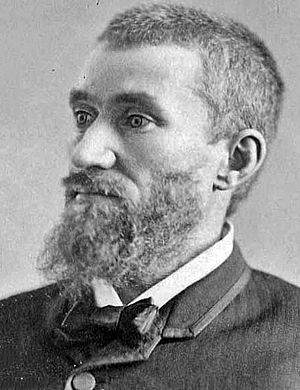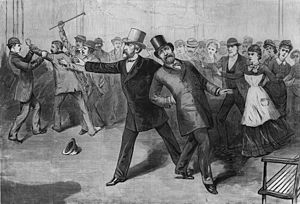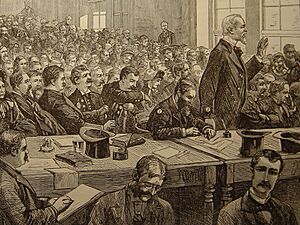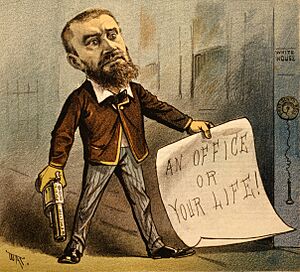Charles J. Guiteau facts for kids
Quick facts for kids
Charles J. Guiteau
|
|
|---|---|

Guiteau in 1881
|
|
| Born |
Charles Julius Guiteau
September 8, 1841 Freeport, Illinois, U.S.
|
| Died | June 30, 1882 (aged 40) D.C. Jail, Washington, D.C., U.S.
|
| Cause of death | Execution by hanging |
| Known for | Assassination of James A. Garfield |
| Political party |
|
| Spouse(s) |
Annie Bunn
(m. 1869; div. 1874) |
| Motive | Mental illness, schizophrenia and/or grandiose narcissism; retribution for perceived failure to reward campaign support |
| Conviction(s) | Murder |
| Criminal penalty | Death |
| Details | |
| Victims | James Abram Garfield, aged 49 |
| Date | July 2, 1881 |
| Location(s) | Washington, D.C., U.S. |
| Signature | |
 |
|
Charles Julius Guiteau (/ɡɪˈtoʊ/ GHIH-toh; September 8, 1841 – June 30, 1882) was an American who assassinated James A. Garfield, president of the United States, in 1881. Guiteau falsely believed he had played a major role in Garfield's election victory, for which he should have been rewarded with a consulship. He felt frustrated and offended by the Garfield administration's rejections of his applications to serve in Vienna or Paris to such a degree that he decided to kill Garfield and shot him at the Baltimore and Potomac Railroad Station in Washington, D.C. Garfield died two months later from infections related to the wounds. In January 1882, Guiteau was sentenced to death for the crime and was executed five months later.
Contents
Early life and education
Charles J. Guiteau was born in Freeport, Illinois, the fourth of six children of Jane August (née Howe; 1814–1848) and Luther Wilson Guiteau (1810–1880), whose family was of French Huguenot ancestry. His mother died in 1848, and in 1850 he moved with his family to Ulao, Wisconsin (near current-day Grafton), where he lived until 1855. Soon after, Guiteau and his father moved back to Freeport.
In 1860, Guiteau inherited $1,000 (equivalent to $33,000 in 2022) from his grandfather and planned to attend the University of Michigan but he failed the entrance examinations because of inadequate academic preparation. He crammed in French and algebra at Ann Arbor High School in Ann Arbor, Michigan, where he received numerous letters from his father that extolled the Oneida Community, so he quit school before completing the program. In June 1860 he joined the Oneida Community, the utopian religious sect in Oneida, New York, with which Guiteau's father already had a close affiliation. According to Brian Resnick of The Atlantic, Guiteau "worshiped" the group's founder, John Humphrey Noyes, once writing that he had "perfect, entire and absolute confidence in him in all things".
Despite the "group marriage" aspects of the Oneida Community, Guiteau was generally rejected during his five years there and his name was turned into a play on words to create the nickname "Charles Gitout". He left the community twice; the first time, he went to Hoboken, New Jersey, and attempted to start a newspaper based on the Oneida religion, called The Daily Theocrat. This failed and he returned to Oneida, only to leave again and file lawsuits against Noyes, in which he demanded payment for the work he had supposedly performed on behalf of the Oneida Community. Guiteau's embarrassed father wrote letters in support of Noyes, who considered Guiteau irresponsible and insane.
Career
Guiteau worked as a clerk at a Chicago law firm and passed a cursory examination to attain admission to the bar. He was not successful as a lawyer, arguing only one case in court, which ended in his client being convicted, and the bulk of his business was in bill collecting. In 1869 he met and married librarian Annie Bunn. She later detailed his dishonest dealings, describing how he would keep disproportionate amounts from his collections and rarely give the money to his clients.
In 1872, Guiteau and his wife moved to New York City one step ahead of bill collectors and dissatisfied clients. Guiteau took an interest in politics and identified with the Democratic Party. In the 1872 presidential election, he supported Horace Greeley, the Liberal Republican and Democratic candidate, against incumbent Republican Ulysses S. Grant. Guiteau prepared a disorganized speech in support of Greeley, which he delivered once. Greeley was badly defeated, but during the campaign Guiteau became convinced that if Greeley won, he would appoint Guiteau as minister (ambassador) to Chile.
Turning back to religion, Guiteau published a book on the subject called The Truth, which was almost entirely plagiarized from the work of Noyes. By 1875, Guiteau's father had become convinced that his son was possessed by Satan. Conversely, Guiteau himself became increasingly convinced that his actions were divinely inspired, and that his destiny was to "preach a new Gospel" like Paul the Apostle. He wandered from town to town preaching, and in December 1877 gave a lecture at the Congregational Church in Washington, D.C.
Guiteau spent the first half of 1880 in Boston, which he left owing money and under suspicion of theft. On June 11, 1880, he was a passenger on the SS Stonington when it collided with the SS Narragansett at night in heavy fog near the mouth of the Connecticut River. Stonington was able to return to port, but Narragansett burned to the waterline and sank with significant loss of life. Although none of his fellow passengers on Stonington were injured, the incident left Guiteau believing that he had been spared for a higher purpose.
Guiteau's interest then turned again to politics. During the 1880 presidential campaign, the Republican Party was largely split into factions – the Stalwarts, led by Roscoe Conkling, who supported Grant for a third term, and the Half-Breeds, who supported James G. Blaine. Guiteau decided to support the Stalwarts and wrote a speech in support of Grant called "Grant against Hancock", which he revised to "Garfield against Hancock" after Garfield (not affiliated with either faction) won the Republican nomination. Ultimately, Guiteau changed little more in the text than switching Grant's name to Garfield's. The speech was delivered at most twice, and printed copies were passed out to members of the Republican National Committee at their summer 1880 meeting in New York, but Guiteau believed himself to be largely responsible for Garfield's victory over Democrat Winfield Scott Hancock that November. He insisted he should be awarded a consulship for his supposedly vital assistance, first asking for Vienna, then deciding that he would rather have the one in Paris. Guiteau's personal requests to Garfield and his cabinet as one of many job seekers who lined up every day to see them in person were continually rejected, as were his numerous letters.
By the early days of Garfield's administration, which commenced in March 1881, Guiteau was living in Washington, D.C., destitute and forced to sneak between rooming houses without paying for his lodging and meals, and to walk around the cold, snowy city in a threadbare suit, without a coat, hat or boots. He spent his days in hotel lobbies reading discarded newspapers to keep track of the schedules of Garfield and his cabinet and making use of the hotels' complimentary stationery to write letters to them pressing his claim for a consulship. In the spring, Guiteau was still in Washington, and on May 14, 1881, he once more encountered Blaine, now Secretary of State, and inquired about a consular appointment; an exasperated Blaine finally snapped, "Never speak to me again on the Paris consulship as long as you live!"

Assassination of Garfield
Guiteau considered himself a loyal Republican and a Stalwart, and convinced himself that his work for the party had been critical to Garfield's election to the presidency. Later convinced that Garfield was going to destroy the Republican Party by scrapping the patronage system, and distraught after his final encounter with Blaine, he decided the only solution was to remove Garfield and elevate Vice President Chester A. Arthur, an acolyte of Senator Conkling, the Stalwart leader who managed Grant's 1880 campaign and who was not on friendly terms with Garfield.
On one occasion, Guiteau trailed Garfield to the since-demolished Baltimore and Potomac Railroad Station as the president was seeing his wife off to a beach resort in Long Branch, New Jersey, but he decided to postpone his plan because Garfield's wife Lucretia was in poor health and Guiteau did not want to upset her. Having been alerted to the president's schedule by a newspaper article, on July 2, 1881, he lay in wait for Garfield at the railroad station, getting his shoes shined, pacing, and engaging a cab to take him to the station later. As Garfield entered the station, looking forward to a vacation with his wife in Long Branch, Guiteau stepped forward and wounded Garfield. As he surrendered to authorities, Guiteau said: "I am a Stalwart of the Stalwarts. ... Arthur is president now!"
Death of Garfield
After a long, painful battle with infections, possibly brought on by his doctors, Garfield died on September 19, 11 weeks after being shot. Modern physicians familiar with the case state that Garfield would have easily recovered from his wounds with sterile medical care, which was not common in the United States until a decade later, while Candice Millard argues that Garfield would have survived Guiteau's bullet wound had his doctors simply left him alone. Rutkow, a professor of surgery at the University of Medicine and Dentistry of New Jersey, has argued that starvation also played a role. Rutkow suggests "Garfield had such a nonlethal wound. In today's world, he would have gone home in a matter of two or three days."
Trial and execution
Once Garfield died, the government officially charged Guiteau with murder. He was formally indicted on October 14, 1881, on the charge of murder, which previously had been attempted murder after his arrest. Guiteau pleaded not guilty to the charge. The trial began in Washington, D.C., on November 17, 1881, in the Supreme Court for the District of Columbia (now the U.S. District Court for the District of Columbia). The presiding judge in the case was Walter Smith Cox. Although Guiteau would insist on trying to represent himself during the entire trial, the court appointed Leigh Robinson to defend him. In less than a week of trial, Robinson retired from the case. George Scoville then became lead counsel for the defense. While Scoville's legal experience lay in land title examination, he had married Guiteau's sister and was thus obliged to defend him in court when no one else would. Wayne MacVeagh, the U.S. Attorney General, served as the chief prosecutor. MacVeagh named five lawyers to the prosecution team: George Corkhill, Walter Davidge, retired judge John K. Porter, Elihu Root, and E. B. Smith.
Guiteau's trial was one of the first high-profile cases in the United States where a defense based on a claim of temporary insanity was considered. Guiteau vehemently insisted that while he had been legally insane at the time of the shooting (because God had taken away his free will) he was not really medically insane, which was one of the major causes of the rift between him and his defense lawyers. The judge gave the jury instructions based on the M'Naghten test.
The defense hired Edward Charles Spitzka, a leading alienist, a now-archaic term for a psychiatrist, as an expert witness in support of an insanity defense. Spitzka had stated that it was clear "Guiteau is not only now insane, but that he was never anything else." While on the stand, Spitzka testified that he had "no doubt" that Guiteau was both insane and "a moral monstrosity". He came to the conclusion that Guiteau had "the insane manner" he had so often observed in asylums, adding that Guiteau was a "morbid egotist" with "a tendency to misinterpret the real affairs of life". He thought the condition to be the result of "a congenital malformation of the brain".
Corkhill, who was the District of Columbia's district attorney and on the prosecuting team, summed up the prosecution's opinion of Guiteau's insanity defense in a pre-trial press statement that also mirrored public opinion on the issue:
He's no more insane than I am. There's nothing of the mad about Guiteau: he's a cool, calculating blackguard, a polished ruffian, who has gradually prepared himself to pose in this way before the world. He was a deadbeat, pure and simple. Finally, he got tired of the monotony of deadbeating. He wanted excitement of some other kind and notoriety ... and he got it.
Guiteau became something of a media sensation during his entire trial for his bizarre behavior, which included him frequently cursing and insulting the judge, most of the witnesses, the prosecution, and even his defense team, as well as formatting his testimony in epic poems which he recited at length, and soliciting legal advice from random spectators in the audience via passed notes. He dictated an autobiography to the New York Herald, ending it with a personal ad for "a nice Christian lady under 30 years of age". He was oblivious to the American public's hatred of him, even after he was almost assassinated twice himself. He frequently smiled and waved at spectators and reporters in and out of the courtroom.
Guiteau sent a letter in which he argued that Arthur should set him free because he had just increased Arthur's salary by making him president. At one point, Guiteau argued before Cox that Garfield was killed by medical malpractice. Throughout the trial and up until his execution, Guiteau was housed at St. Elizabeths Hospital in the southeastern quadrant of Washington, D.C. While in prison and awaiting execution, Guiteau wrote a defense of the assassination he had committed and an account of his own trial, which was published as The Truth and the Removal.
To the end, Guiteau was making plans to start a lecture tour after his perceived imminent release and to run for president himself in 1884, while at the same time continuing to delight in the media circus surrounding his trial. He was found guilty on January 25, 1882, and sentenced to death. Guiteau appealed his conviction, but the appeal was rejected.
Twenty-nine days before his execution, Guiteau composed a lengthy poem asserting that God had commanded him to kill Garfield to prevent Blaine's "scheming" to war with Chile and Peru. Guiteau also claimed in the poem that now-President Arthur knew the assassination had saved the United States, and that Arthur's refusal to pardon him was the "basest ingratitude". He also (incorrectly) presumed that Arthur would pressure the Supreme Court into hearing his court appeal.
Guiteau was executed on June 30, 1882, in the District of Columbia, just two days before the first anniversary of the shooting. Guiteau survived his victim by nine months and eleven days, a longer period than any other presidential assassin.
See also
 In Spanish: Charles J. Guiteau para niños
In Spanish: Charles J. Guiteau para niños
- List of assassins
- List of people who died by hanging
- Patronage
- Stalwart (politics)
- John Wilkes Booth, assassin of President Abraham Lincoln
- Leon Czolgosz, assassin of President William McKinley
- Lee Harvey Oswald, assassin of President John F. Kennedy




